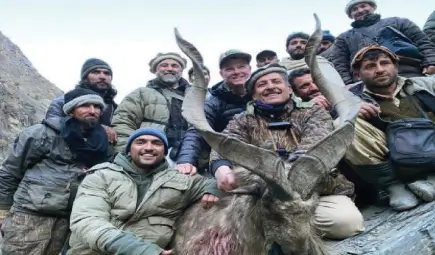American Bags Year’s First Markhor Trophy in Chitral.
American Takes Down First Markhor of the Season in Chitral, Sparking Debate
For $185,000, American hunter Deron James Millman bagged the year’s first Markhor trophy in Chitral, Pakistan.
This prestigious kill, however, ignites mixed reactions as it brings spotlight to the controversial practice of trophy hunting.
Millman’s target, a 9.5-year-old Kashmir Markhor, was found not amidst mountain peaks, but surprisingly in a wheat field near Shali village.
This convenient location, attributed to community-based conservation efforts, raises questions about the hunting’s ethics and environmental impact.
The Markhor, known as the “mountain monarch,” is a majestic wild goat indigenous to Northern Pakistan. Despite conservation efforts, it remains an endangered species. This fact fuels the debate surrounding trophy hunting, with arguments for and against the practice:
Supporting Arguments:
- Trophy hunting generates significant revenue for conservation initiatives.
- Properly managed hunting programs can control animal populations and prevent ecological imbalances.
- Local communities benefit from revenue and infrastructure development associated with hunting permits.
Opposing Arguments:
- Trophy hunting jeopardizes endangered species like the Markhor.
- Ethical concerns arise around killing majestic animals for sport.
- Alternative revenue streams for conservation exist, such as ecotourism.
The Markhor’s size, with 45-inch horns (though short of the Chitral record of 53 inches), adds another layer to the discussion. Some view it as a testament to healthy wildlife populations, while others see it as a target potentially fueling excessive hunting pressure.
Ultimately, the debate surrounding trophy hunting remains complex and nuanced. Millman’s hunt in Chitral will undoubtedly contribute to ongoing conversations about balancing conservation, economic benefits, and animal welfare.
Note: The information above might not be accepted 100%. Please verify from your own sources. We will not be responsible for any kind of loss due to our content.
For more news, please visit Munafa Marketing.




